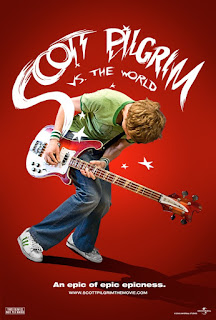
We had a son the other day. Wednesday, to be exact. Hence the unexplained two weekdays in a row without a new blog post. We're still at the hospital until tomorrow, but an emergency has come up that makes it necessary that I get a quickie in now.
As much as you weigh the pros and cons of a name before choosing it, there's always a way to screw up in ways you never could have imagined.
Our son is named Jasper. We love the name, everyone else loves the name (or so they say). My mom gave off a surprised laugh when she first heard it, but I think she likes it too.
But a few minutes ago, when we met our umpteenth nurse who will be taking care of us for the length of her shift, and we told her his name, she uttered a dreaded word: "Twilight."
It was early in the morning so I didn't figure out exactly what she'd said, but I immediately pulled out my laptop to check.
Yes indeed, there is a character named Jasper in the Twilight movies. In fact, you're looking at him above.
He's a secondary character, to be sure -- it's not like we named our son Edward or Jacob. (I do have friends who named their son Jake just before the Twilight phenomenon exploded -- though I think that's his full name, not short for Jacob at least.) But he's prominent enough to have his own promotional artwork. And boy does he look milquetoast and "wet," to use a term my wife (an Australian) uses. "Wet" means about the same thing as milquetoast. Yes, he looks the teen heartthrob equivalent of "intense," but doesn't he also look like he might be about to cry?
I only saw the first Twilight, and it was before we were pregnant, and my wife wouldn't touch this series with a ten-foot pole, so I don't know how we would have been expected to know about this. Looking on IMDB, Jasper Whitlock (played by Jackson Rathbone -- funny, Jackson was another name we were considering) is the 13th listed member of the cast of characters. So, not that prominent, all told. In Twilight: New Moon, he's moved up to 11th, and for some reason is now called Jasper Hale. (I guess I would have to see it to understand why.) In Twilight: Eclipse, he's muscled his way up to ninth -- I don't like this trend. And he's the seventh highest listed cast member in the two parts of Twilight: Breaking Dawn, due out in 2011 and 2012.
So what does it all mean, other than the fact that I generally detest anything associated with Twilight?
For one, it means that Jasper will not be nearly as uncommon a name as we expected it to be. And while we chose it for its uniqueness, I suppose there's a benefit to not giving our son the weirdest name anyone's ever heard of.
But I'm also a bit worried that the other Jaspers out there will give our Jasper a bad name. Far be it from me to stereotype, and no offense meant to you, dear reader, if you are a Twilight fan. But if you are a person who's naming your son Jasper specifically because that's the name of a character in Twilight, I'm concerned about the genes you will be passing on to him. I really don't want my Jasper to be confused with a bunch of little goth Jaspers running around, looking like the Jasper you see above.
Oh well. Nothing we can do now.
But we love our little Jasper. And I must say, if I hadn't been posting about this, I might have been posting about the birth of a child being one of life's truly cinematic moments. And it lived up to all my expectations in that regard. I was the supportive husband, soon-to-be-daddy, holding my wife's hand, telling her she could do it, telling her to push, praising the job she was doing. And then, after a surprisingly short amount of pushing, there was my son's head, peeking out, ready to join the outside world. Moments later, his little blue alien body emerged, and I had a video camera in one hand, scissors to cut the umbilical cord in the other, blubbering like an idiot.
And it was wonderful.




















